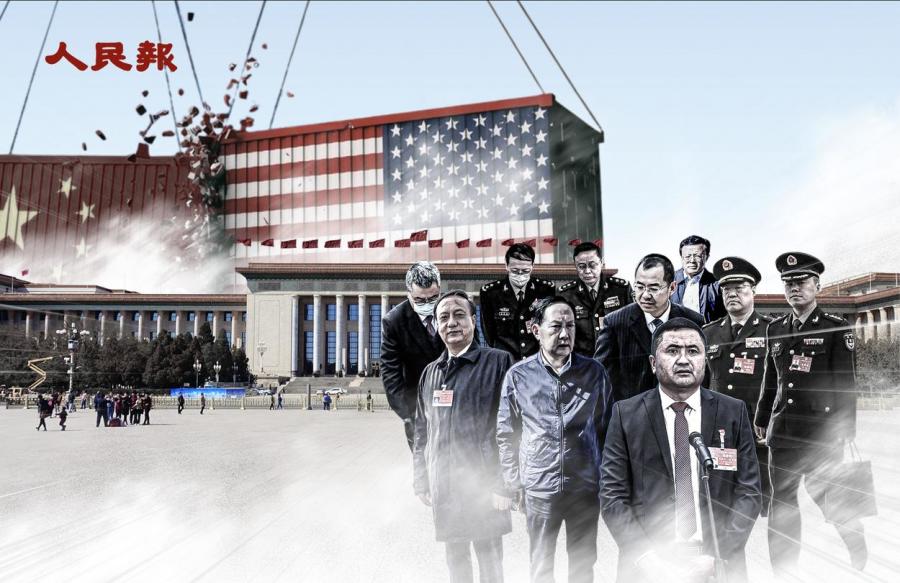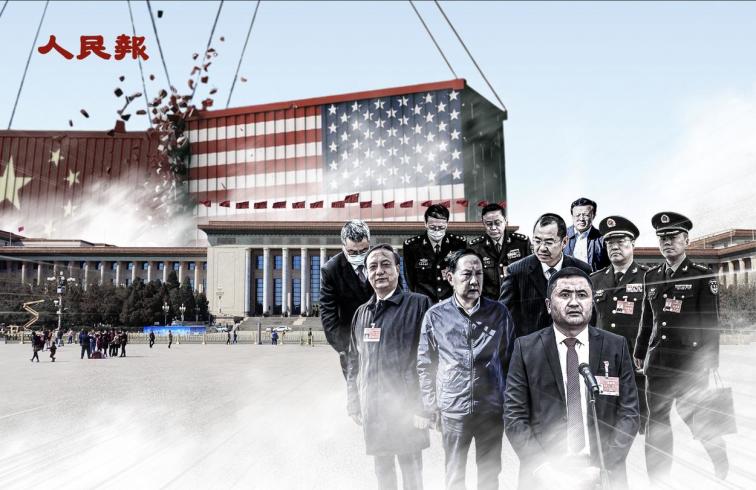The CCP Hold the Most Disastrous Sessions in History(Illustration by People News)
[People News] On October 23, the communiqué from the CCP’s Fourth Plenary Session dispelled many rumors—perhaps disappointing outsiders. What could have been an open showdown within the CCP seems to have fallen into a “stalemate.” The Party leader kept all his titles but could not promote any of his own loyalists. The number of Politburo members has shrunk to 23, with no replacements; three seats on the Central Military Commission (CMC) remain vacant, also unfilled; and Zhang Shengmin’s appointment as CMC vice chairman is merely a minor adjustment. The Communist Youth League faction failed to return to the power center, and Beijing’s political “stalemate” appears to be a dead end.
Military Pressure Fails?
On October 17, China’s Ministry of Defense suddenly announced the disciplinary results for nine generals, including He Weidong and Miao Hua. The military, acting on behalf of the “Central Committee,” seemed to be exerting palace pressure—a move suggesting that factions might face off at the plenary session and trigger major upheaval. But no leadership reshuffle took place, and the military’s attempt appears unsuccessful.
On the first day of the session, rumors spread quickly that Xi Jinping would remain General Secretary but step down as Chairman of the CMC, with Zhang Youxia taking over and being promoted to Politburo Standing Committee—thus making it “the Party commanding the gun.” That did not happen, likely because CCP elders and senior officials were unwilling to go public with a confrontation, and Zhang Youxia himself probably did not want to become the target of all sides.
Reports of Youth League officials rising also failed to materialize, leaving uncertainty. Perhaps the faction lacked sufficient support among Central Committee members, or perhaps the elders feared that a showdown would cause greater political chaos. It’s also possible no one wanted to wade into muddy waters or inherit an unmanageable mess.
Nevertheless, the disciplinary actions against He Weidong and others announced by the military before the session were later confirmed at the meeting.
Over a year ago, the Third Plenary Session confirmed Politburo decisions expelling Li Shangfu, Li Yuchao, and Sun Jinming. This Fourth Plenary Session likewise confirmed Politburo decisions expelling He Weidong, Miao Hua, Tang Renjian, Jin Xiangjun, He Hongjun, Wang Xiubin, Lin Xiangyang, Qin Shutang, Yuan Huazhi, Wang Chunning, Li Shisong, Yang Fasen, Zhu Zhishong, and Zhang Fengzhong.
However, after the Politburo meeting on September 28, these results were not released through Xinhua. On October 17, when the Ministry of Defense announced them instead of the “Central Committee,” Party media awkwardly reposted, and the CCTV Evening News ignored the story altogether.
Some Central Committee members may not have supported the Youth League’s comeback, but they also didn’t back Xi and his cronies. The session seemed to end with no winner—leaving an incomplete Politburo and CMC.
Calm on the Surface Only
The Party leader kept his titles at the Fourth Plenary Session, appearing to have weathered another major test. But after suffering serious blows, Xi’s faction has not truly recovered—it failed to fill critical vacancies.
Currently, many top posts across the services and theater commands in the PLA remain unfilled. Xi may still hold the title of CMC chairman but has lost control over the military; he cannot promote his chosen officers to CMC positions or even grant new general ranks.
Zhang Shengmin’s promotion to CMC vice chairman likely gives him charge over political work, but he was not elevated to the Politburo. Zhang Youxia should oversee military and overall affairs—meaning he holds command authority. At the previous expanded Politburo meeting, Liu Zhenli appeared but was not promoted to vice chairman, likely remaining as CMC Joint Staff Department Chief of Staff for now.
The subordinates and associates of the nine purged generals are likely still being cleared out.
The session was far from as peaceful as its communiqué claimed.
There were only 168 full Central Committee members attending—31 fewer than the 199 at the Third Plenary Session, meaning over 15% were absent. Fourteen have already fallen, including He Weidong, while others either refused to attend this meaningless performance or were unable to.
There were 147 alternate members present—18 fewer than at the previous session, with four already purged. Eleven alternates were promoted to full membership, but several who should have been promoted by rank order were skipped—either already in trouble or in danger—thus unable to appear.
A “Stalemate” Hard to Break?
The communiqué, filled with empty slogans, tried to hide fierce infighting, but the Defense Ministry’s early announcement of the nine generals’ punishment already shattered the façade of harmony. No reshuffle occurred, yet the Politburo still has only 23 members with no replacements, and the CMC remains at four of seven seats.
The top leader’s position is unchanged, but a successor has yet to emerge. The Youth League’s supposed successor failed to enter the Politburo, and another widely expected one did not rejoin the Central Committee. The Youth League faction may lack sufficient support—or could be waiting for the right moment.
The Fourth Plenary Session’s struggle may remain unresolved—the “stalemate” unbroken.
The CCP continues promoting its so-called “15th Five-Year Plan,” but under the current leader, the previous plans have already fallen apart. The 2020 pandemic and absurd lockdown measures left the 13th Five-Year Plan unfinished; the 14th remains only on paper, while China’s economy falters.
Whoever now controls the situation—or prepares to take over as Party leader—likely cannot fix the mess. That is perhaps the real reason the plenary “stalemate” cannot be broken.
The “Stalemate” May Bring a Bigger Crisis
The Fourth Plenary Session’s “stalemate” may lead to another crisis. The Party leader’s health problems are well known, yet no successor has been named. What happens if he suddenly collapses?
It’s unlikely that senior officials attending the session are indifferent, yet no major personnel decisions were made. One plausible explanation is that the Party leader has already lost power, and the massive expanded Politburo meeting mechanism continues to operate with another figure as its core. If so, the lack of change at the session may be a forced arrangement to maintain stability.
On October 23, the CCP mouthpiece People’s Daily ran a front-page editorial titled “Seeking Stability While Advancing—Strong and Effective Macroeconomic Regulation (Strive Bravely to Win the 14th Five-Year Plan).” The article sent a signal of seeking “stability,” yet also called for extreme stimulus measures to break economic stagnation—reflecting Zhongnanhai’s inner contradictions.
Even if the top leadership changes under such circumstances, China’s domestic and external predicaments will remain. The “stalemate” at the Fourth Plenary Session shows the CCP has run out of options—utterly unable to find a way forward.
The only way out for China now is to dismantle the CCP, return the power and wealth it monopolized to the people, and let the Chinese citizens use their wisdom to find their own path—while those unqualified officials step down.
But because the CCP refuses to give up its privileges and insists on preserving the Party, the Fourth Plenary Session has fallen into this “stalemate”—and this deadlock without an exit is, in truth, a political dead end.
— The Dajiyuan △











News magazine bootstrap themes!
I like this themes, fast loading and look profesional
Thank you Carlos!
You're welcome!
Please support me with give positive rating!
Yes Sure!